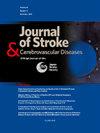Age differences in the change in cognition after stroke
IF 2
4区 医学
Q3 NEUROSCIENCES
Journal of Stroke & Cerebrovascular Diseases
Pub Date : 2024-10-12
DOI:10.1016/j.jstrokecerebrovasdis.2024.108087
引用次数: 0
Abstract
Objective
To compare changes in cognitive trajectories after stroke between younger (18-64) and older (65+) adults, accounting for pre-stroke cognitive trajectories.
Materials and methods
Pooled cohort study using individual participant data from 3 US cohorts (1971-2019), the Atherosclerosis Risk In Communities Study (ARIC), Framingham Offspring Study (FOS), and REasons for Geographic And Racial Differences in Stroke Study (REGARDS). Linear mixed effect models evaluated the association between age and the initial change (intercept) and rate of change (slope) in cognition after compared to before stroke. Outcomes were global cognition (primary), memory and executive function.
Results
We included 1,292 participants with stroke; 197 younger (47.2 % female, 32.5 % Black race) and 1,095 older (50.2 % female, 46.4 % Black race). Median (IQR) age at stroke was 59.7 (56.6-61.7) (younger group) and 75.2 (70.5-80.2) years (older group). Compared to the young, older participants had greater declines in global cognition (-1.69 point [95 % CI, -2.82 to -0.55] greater), memory (-1.05 point [95 % CI, -1.92 to -0.17] greater), and executive function (-3.72 point [95 % CI, -5.23 to -2.21] greater) initially after stroke. Older age was associated with faster declines in global cognition (-0.18 points per year [95 % CI, -0.36 to -0.01] faster) and executive function (-0.16 [95 % CI, -0.26 to -0.06] points per year for every 10 years of higher age), but not memory (-0.006 [95 % CI, -0.15 to 0.14]), after compared to before stroke.
Conclusion
Older age was associated with greater post-stroke cognitive declines, accounting for differences in pre-stroke cognitive trajectories between the old and the young.
中风后认知变化的年龄差异。
目的:比较年轻人(18-64 岁)和老年人(65 岁以上)中风后认知轨迹的变化:比较年轻人(18-64 岁)和老年人(65 岁以上)中风后认知轨迹的变化,同时考虑中风前的认知轨迹:使用 3 个美国队列(1971-2019 年)的个人参与者数据进行汇总队列研究,这 3 个美国队列分别是社区动脉粥样硬化风险研究(ARIC)、弗雷明汉后代研究(FOS)和中风的地域和种族差异原因研究(REGARDS)。线性混合效应模型评估了年龄与认知能力的初始变化(截距)和变化率(斜率)之间的关系。结果包括总体认知(主要)、记忆和执行功能:我们纳入了 1,292 名中风患者,其中年轻患者 197 人(女性占 47.2%,黑人占 32.5%),年长者 1,095 人(女性占 50.2%,黑人占 46.4%)。中风时的中位(IQR)年龄为 59.7(56.6-61.7)岁(年轻组)和 75.2(70.5-80.2)岁(老年组)。与年轻人相比,老年参与者在中风后初期的整体认知(-1.69 分 [95 % CI, -2.82 to -0.55])、记忆(-1.05 分 [95 % CI, -1.92 to -0.17])和执行功能(-3.72 分 [95 % CI, -5.23 to -2.21])下降幅度更大。与脑卒中前相比,年龄越大,脑卒中后总体认知(每年下降 0.18 分 [95 % CI, -0.36 到 -0.01])和执行功能(年龄每增加 10 岁,每年下降 0.16 分 [95 % CI, -0.26 到 -0.06])下降越快,但记忆力(-0.006 [95 % CI, -0.15 到 0.14])下降不明显:结论:年龄越大,脑卒中后认知能力下降的幅度越大,这与老年人和年轻人脑卒中前认知轨迹的差异有关。
本文章由计算机程序翻译,如有差异,请以英文原文为准。
求助全文
约1分钟内获得全文
求助全文
来源期刊

Journal of Stroke & Cerebrovascular Diseases
Medicine-Surgery
CiteScore
5.00
自引率
4.00%
发文量
583
审稿时长
62 days
期刊介绍:
The Journal of Stroke & Cerebrovascular Diseases publishes original papers on basic and clinical science related to the fields of stroke and cerebrovascular diseases. The Journal also features review articles, controversies, methods and technical notes, selected case reports and other original articles of special nature. Its editorial mission is to focus on prevention and repair of cerebrovascular disease. Clinical papers emphasize medical and surgical aspects of stroke, clinical trials and design, epidemiology, stroke care delivery systems and outcomes, imaging sciences and rehabilitation of stroke. The Journal will be of special interest to specialists involved in caring for patients with cerebrovascular disease, including neurologists, neurosurgeons and cardiologists.
 求助内容:
求助内容: 应助结果提醒方式:
应助结果提醒方式:


